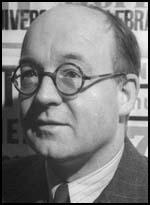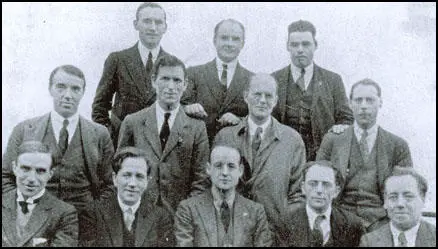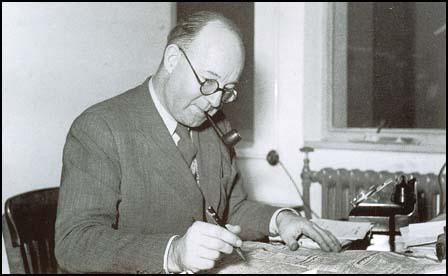William Rust

William Rust was born in Camberwell on 24th April 1903. He worked for the Hulton's Press Agency, before moving to the Worker's Dreadnought, a newspaper produced by Sylvia Pankhurst.
Rust had been impressed with the achievements of the Bolsheviks following the Russian Revolution and in April 1920 he joined the Communist Party of Great Britain (CPGB), an organization formed by Tom Bell, Willie Gallacher, Arthur McManus, Harry Pollitt, Helen Crawfurd, A. J. Cook, Rajani Palme Dutt, Albert Inkpin and Willie Paul. McManus was elected as the party's first chairman and Bell and Pollitt became the party's first full-time workers.
Rust became involved in the early unemployed movement in the 1920s and along with Clara Gilbert Cole formed the group Camberwell Organized Unemployed. In January 1921, people living in cottages in Ormside Street, Camberwell, were evicted by a local businessman. A group of people, headed by Cole and Rust, attempted to "reinstate" these evicted people. They were arrested and on 11th July, appeared in court. Cole published her account in the Women’s Dreadnought: "The case lasted nearly all day, not in the interests of justice – it was merely a pretense – but in order that the law might be able to boast it allowed Dallas and Rust to call witnesses. The evidence of these same witnesses was entirely ignored in the summing up. The sentence was a foregone conclusion. I had long since ceased to expect anything but injustice in the Courts. Property is far, far more sacred than life." Rust was sent to prison for 28 days.
In 1923 Rust joined the executive of the CPGB as a representative of the Young Communist League. He also attended the Fifth Congress of the Communist International in Moscow. According to Francis Beckett, the author of Enemy Within (1995): "The Comintern successfully used the Young Communist League, led by Bill Rust and Dave Springhall, to impose its will on the CP... Rust and Springhall were young working-class Londoners who had grown up in the Party. It was their life and their career. To them obedience to Moscow was as natural as eating."
On 4th August 1925, Rust and 11 other activists, Jack Murphy, Robin Page Arnot, Ernie Cant, Tom Wintringham, Harry Pollitt, Albert Inkpin, Arthur McManus, Tom Bell, Wal Hannington, William Gallacher and John Campbell were arrested for being members of the Communist Party of Great Britain and charged with violation of the Mutiny Act of 1797.
Tom Bell explained: "The indictment against the twelve read as follows: That between 1 January, 1924, and 21 October, 1925, the prisoners had: 1. Conspired to publish a seditious libel. 2. Conspired to incite to commit breaches of the Incitement to Mutiny Act, 1797. 3. Conspired to endeavour to seduce persons serving in His Majesty's forces to whom might come certain published books and pamphlets, to wit, the Workers' Weekly, and certain other publications mentioned in the indictment, and to incite them to mutiny." It was believed that the arrests was an attempt by the government to weaken the labour movement in preparation for the impending General Strike.

Harry Pollitt, Ernie Cant, Tom Wintringham, Albert Inkpin; (Front Row)
John R. Campbell, Arthur McManus, William Rust, Robin Page Arnot, Tom Bell
The Communist Party of Great Britain decided that William Gallacher, John R. Campbell and Harry Pollitt should defend themselves. Tom Bell added: "their speeches were prepared, and approved by the Political Bureau (of the CPGB). To challenge the legality of the proceedings Sir Henry Slesser was engaged to defend the others. During the trial Judge Swift declared that it was "no crime to be a Communist or hold communist opinions, but it was a crime to belong to this Communist Party."
John Campbell later wrote: "The Government was wise enough not to rest its case on the activity of the accused in organising resistance to wage cuts, but on their dissemination of “seditious” communist literature, (particularly the resolutions of the Communist International), their speeches, and occasional articles... Five of the prisoners who had previous convictions, Gallacher, Hannington, Inkpin, Pollitt and Rust, were sentenced to twelve months’ imprisonment and the others (after rejecting the Judge’s offer that they could go free if they renounced their political activity) were sentenced to six months."
In July 1928 at the Comintern Congress, Rust denounced the leadership of the Communist Party of Great Britain. He said that they had been too sympathetic to non-communist left wingers such as James Maxton and A. J. Cook. Rust was highly critical of Albert Inkpin and added that only Rajani Palme Dutt and Robin Page Arnot were the "only correct theoreticians it possessed".
In 1930, Rust became the first editor of the party's newspaper, the Daily Worker. He served for two years, before becoming the CPGB's representative in Moscow. This was followed by becoming a party organiser in Lancashire. Rust was described by a colleague at this time as "round and pink and cold as ice." Another friend said that he rarely saw him smile.
Rust, along with Rajani Palme Dutt, Harry Pollitt, John R. Campbell and William Gallacher, played an important role in maintaining support for Joseph Stalin in his struggle with Leon Trotsky. In the Daily Worker he attempted to justify the Great Purge.
The Communist Party of Great Britain supported the Popular Front government during the Spanish Civil War. Officially Rust became the Daily Worker representative with the International Brigade in Spain where he served with Will Paynter and Harry Dobson. In reality he was Britain's senior commissar and a Comintern representative, with an office in Barcelona.

In September 1939, Harry Pollitt welcomed the British declaration of war on Nazi Germany. Joseph Stalin was furious with Pollitt's statement as the previous month he had signed the Soviet-Nazi Pact with Adolf Hitler.
At a meeting of the Central Committee on 2nd October 1939, Rajani Palme Dutt demanded "acceptance of the (new Soviet line) by the members of the Central Committee on the basis of conviction". He added: "Every responsible position in the Party must be occupied by a determined fighter for the line." Bob Stewart disagreed and mocked "these sledgehammer demands for whole-hearted convictions and solid and hardened, tempered Bolshevism and all this bloody kind of stuff."
William Gallacher agreed with Stewart: "I have never... at this Central Committee listened to a more unscrupulous and opportunist speech than has been made by Comrade Dutt... and I have never had in all my experience in the Party such evidence of mean, despicable disloyalty to comrades." Harry Pollitt joined in the attack: "Please remember, Comrade Dutt, you won't intimidate me by that language. I was in the movement practically before you were born, and will be in the revolutionary movement a long time after some of you are forgotten."
John R. Campbell, the editor of the Daily Worker, thought the Comintern was placing the CPGB in an absurd position. "We started by saying we had an interest in the defeat of the Nazis, we must now recognise that our prime interest in the defeat of France and Great Britain... We have to eat everything we have said."
Harry Pollitt then made a passionate speech about his unwillingness to change his views on the invasion of Poland: "I believe in the long run it will do this Party very great harm... I don't envy the comrades who can so lightly in the space of a week... go from one political conviction to another... I am ashamed of the lack of feeling, the lack of response that this struggle of the Polish people has aroused in our leadership."
However, when the vote was taken, only Harry Pollitt, John R. Campbell and William Gallacher voted against. Pollitt was forced to resign as General Secretary and he was replaced by Rajani Palme Dutt and William Rust took over Campbell's job as editor of the Daily Worker. Over the next few weeks the newspaper demanded that Neville Chamberlain respond to Hitler's peace overtures.
On 22nd June 1941 Germany invaded the Soviet Union. That night Winston Churchill said: "We shall give whatever help we can to Russia." The CPGB immediately announced full support for the war and brought back Harry Pollitt as general secretary. Membership increased dramatically from 15,570 in 1938 to 56,000 in 1942.
Rust attempted to turn the Daily Worker into a popular mass paper. According to Francis Beckett: "He was a fine editor: a cynical boss who thumped the table in his furious rages, he nonetheless inspired journalists' best work. A tall and by now heavily built man, Rust was one of the Party's most able people, and one of the least likeable." Sales reached 120,000 in 1948.
Douglas Hyde, the news editor, later recalled: "We would sit in a room, just half a dozen of us, and talk about the political issues of the day." However, it was Rajani Palme Dutt who decided on the newspaper's policy. "When we had all had our say, Dutt would drape his arm over the arm of his chair - he had the longest arms I have ever seen - bang his pipe out on the sole of his shoe, and sum up. Often the summing up was entirely different from the conclusions we were all reaching, but no one ever argued."
William Rust, aged 46, died of a massive heart-attack on 3rd February 1949.
Primary Sources
(1) William Rust, Labour and Armaments (1937)
Twenty-four hours after he had paid a solemn tribute to the dead on the occasion of the eighteenth commemoration of Armistice Day, Mr. Baldwin blandly informed a startled House of Commons that for a long period he had deliberately concealed his rearmament policy and renunciation of collective security in order to make sure of winning the last General Election.
With what he himself described as “appalling frankness,” he told the House that being aware of the peace sentiment of the people and the impossibility of openly putting over competitive rearmament, he had been reluctantly compelled to deceive them for their own good! By promising undying allegiance to the League of Nations and by covering up his new colossal arms plan (described by Chamberlain as a proposal to “fill up the gaps in our defences”), Baldwin won the votes of those millions of peace lovers who took him at his word. With a comfortable majority behind him, and with the £300,000,000 arms programme well launched, the trickster now takes the victims into his confidence.
We are not concerned here to argue the morality of Mr. Baldwin’s action or the psychological explanation of a reputation for honesty and straight dealing so largely based on a frank admission of deceit. But it is worth while to observe that the Prime Minister’s open contempt for Democracy is grist to the mill of fascism and that the intelligent elector must be already wondering what new deception (to be revealed only in 1937 or 1938) is being put over at this particular moment.
Our chief concern is to deal with the practical results of the Great Deception and to find if, even at this late hour, the frustrated desires of the people for a policy of peace can be realised.
Baldwin would have us believe that he resorted to the policy of international competitive armaments because the policy of peace, collective security and armament reduction had failed. In reality it was the other way round. It was the National Government’s deliberate abandonment of collective security that plunged the world into the new armaments race. Let the facts speak for themselves.
(2) Francis Beckett, Enemy Within (1995)
He (William Rust) was a fine editor: a cynical boss who thumped the table in his furious rages, he nonetheless inspired journalists' best work. A tall and by now heavily built man, Rust was one of the Party's most able people, and one of the least likeable.

